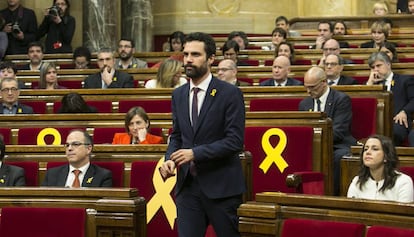New Catalan speaker under pressure to allow Puigdemont bid
Roger Torrent is being pushed to let the ousted premier be sworn in remotely

As the Catalan assembly reconvened on Wednesday following the December 21 elections, the separatist majority scored its first victory of the parliamentary term by securing control of the Mesa, the chamber’s governing board, whose top member and speaker of the house is now Roger Torrent, of the Catalan Republican Left (ERC).
Mechanisms are what they are and processes are what they are
Roger Torrent, speaker
The next major milestone on the agenda is the debate to elect a new Catalan premier; this session must take place by January 31. Junts per Catalunya, the group headed by ousted premier Carles Puigdemont, insists that he is the only choice to lead the region despite the fact that he is living in self-imposed exile in Brussels and that parliamentary bylaws expressly forbid remote appointments.
The central government in Madrid has warned that it will appeal such a move in the courts if the separatist majority in parliament goes ahead with it anyway.
Separatist rift
Torrent’s statements on Wednesday have already created unrest within separatist ranks. The CUP, a far-left group born out of the squatter movement, has criticized the new speaker for what it views as a weak “autonomist” speech that avoided mentioning the October 1 referendum or the independence declaration.
CUP leader Carles Riera accused Torrent of betraying the spirit of October 1, and warned that his party’s support at the investiture debate is up in the air, and that they will only negotiate with ERC and Junts per Catalunya on measures “to materialize the republic.” The CUP is down to four seats in the Catalan parliament from an earlier 10, but still holds the key to a separatist majority.
In his address to parliament on Wednesday, Torrent adopted a conciliatory tone, noting that “I want to contribute to mending Catalan society,” which he described as a society of “crossed identities.” He pledged to reach out across the aisle as he says he did while serving as mayor of Sarrià de Ter (Girona).

Following his appointment, Torrent changed the description on his Twitter profile, which now reads “15th Speaker of the Parliament of Catalonia.” Until then, it had said “Deputy of the Parliament of the Catalan Republic.” In his speech, Torrent avoided using any references to a Catalan republic or to the independence declaration of last year.
He also asked lawmakers to avoid the bad blood on display at some sessions during the last political term. Torrent asked for “respect for this institution and for the popular will. I want to make democracy and social harmony the mainstays of my tenure.”
Puigdemont
Right after his election as new speaker, Torrent began feeling the pressure to let Puigdemont be remotely sworn in as the next Catalan premier, even though parliament lawyers recently said in a report that this option is not allowed by the chamber’s bylaws.
On Thursday morning, Torrent deflected questions regarding his position on this issue. “I will not go into hypothetical scenarios. It is up to the Mesa to make that assessment,” he said in statements to the Catalan radio station RAC1. “Mechanisms are what they are and processes are what they are.”
The CUP is accusing Torrent of betraying the spirit of the republic
On January 8, before his appointment, Torrent had stated that it was up to parliament lawyers to figure out what the rules say regarding a remote investment. But he now faces growing pressure from Junts per Catalunya to let it happen.
“We trust that in two weeks we will be able to bring President Puigdemont to the investiture debate. We consider this to be the will of the people as expressed at the polls,” said Elsa Artadi, a deputy who worked as campaign manager for Junts per Catalunya.
“Lawyers draft advisory reports, but the Mesa or the body of lawmakers as a whole have the agency to see how these are implemented,” insisted Artadi.
So far, ERC insists that it is supporting Puigdemont’s nomination, but that nothing has been agreed to in terms of legal ways to get him sworn in.
While Puigdemont fled Spain shortly after the unilateral independence declaration to escape a criminal probe into rebellion, sedition and misuse of public funds, his deputy Oriol Junqueras, the longtime leader of ERC, stayed and was remanded in custody. He remains in a Madrid penitentiary after the Supreme Court denied his requests for release, but he was allowed to vote by proxy on Wednesday.
If Puigdemont’s bid fails, Junqueras is widely expected to step up as a candidate to the premiership. On Tuesday, Joan Tardà, a deputy for ERC who sits in the Spanish Congress, noted that “the greater good is a pro-independence government,” beyond any specific names.
English version by Susana Urra.
Tu suscripción se está usando en otro dispositivo
¿Quieres añadir otro usuario a tu suscripción?
Si continúas leyendo en este dispositivo, no se podrá leer en el otro.
FlechaTu suscripción se está usando en otro dispositivo y solo puedes acceder a EL PAÍS desde un dispositivo a la vez.
Si quieres compartir tu cuenta, cambia tu suscripción a la modalidad Premium, así podrás añadir otro usuario. Cada uno accederá con su propia cuenta de email, lo que os permitirá personalizar vuestra experiencia en EL PAÍS.
¿Tienes una suscripción de empresa? Accede aquí para contratar más cuentas.
En el caso de no saber quién está usando tu cuenta, te recomendamos cambiar tu contraseña aquí.
Si decides continuar compartiendo tu cuenta, este mensaje se mostrará en tu dispositivo y en el de la otra persona que está usando tu cuenta de forma indefinida, afectando a tu experiencia de lectura. Puedes consultar aquí los términos y condiciones de la suscripción digital.








































